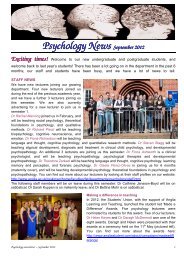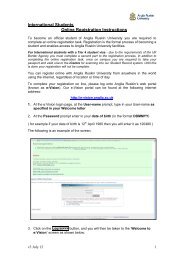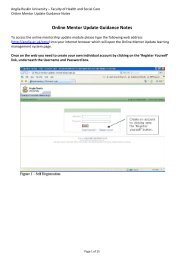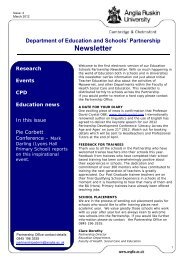Supporting the underachieving learner - Guide for mentors
Supporting the underachieving learner - Guide for mentors
Supporting the underachieving learner - Guide for mentors
Create successful ePaper yourself
Turn your PDF publications into a flip-book with our unique Google optimized e-Paper software.
Equally difficult is failing 1st year <strong>learner</strong>s as <strong>the</strong>re is a notion held that problems will resolve as<br />
<strong>learner</strong>s progress through <strong>the</strong>ir programme.<br />
Learners’ personal problems can influence <strong>the</strong> mentor’s judgement.<br />
If <strong>mentors</strong> had not followed all <strong>the</strong> correct procedures or felt that <strong>the</strong>y did not know <strong>the</strong> <strong>learner</strong><br />
well enough, <strong>the</strong>y felt unable to make a fail decision and again felt that <strong>the</strong>y had to give <strong>the</strong> benefit<br />
of <strong>the</strong> doubt.<br />
Mentors had found <strong>the</strong> practice assessment documentation so full of educational jargon <strong>the</strong>y had<br />
difficulty in linking <strong>learner</strong> per<strong>for</strong>mance to learning outcomes. Consequently obscure generalized<br />
comments are written which do not specify <strong>the</strong> underlying concerns about <strong>the</strong> <strong>learner</strong>’s<br />
per<strong>for</strong>mance.<br />
3.3 What happens to <strong>the</strong> <strong>learner</strong> next?<br />
If this is <strong>the</strong> first time that a <strong>learner</strong> has failed <strong>the</strong> placement experience <strong>the</strong>n <strong>the</strong>y are given an<br />
opportunity to repeat <strong>the</strong> outcomes that <strong>the</strong>y have failed. This may take place in ano<strong>the</strong>r practice area but<br />
where appropriate <strong>the</strong> <strong>learner</strong> will be expected to repeat <strong>the</strong>se outcomes in <strong>the</strong> same practice area with<br />
<strong>the</strong> same mentor. If <strong>the</strong> <strong>learner</strong> is required to change placements to repeat <strong>the</strong>se outcomes, <strong>the</strong><br />
documentation identifying reasons <strong>for</strong> failure will be made available to <strong>the</strong> new mentor.<br />
There should be no surprises when a <strong>learner</strong> fails a placement and this includes <strong>the</strong> appropriate HEI,<br />
who should be aware from an early stage of potential / actual difficulties in achieving learning outcomes.<br />
The <strong>learner</strong> has access to a range of support services from <strong>the</strong> HEI, which includes education<br />
champions, link tutors, personal tutors, module leaders, course leaders, counselling and <strong>learner</strong> union<br />
services to help through <strong>the</strong> fail process.<br />
3.4 Summary of <strong>the</strong> fail process<br />
The following points summarise <strong>the</strong> challenges and actions required when failing a <strong>learner</strong>:<br />
Difficult task <strong>for</strong> all involved<br />
Ensure discussions are conducted in private<br />
Re-iterate <strong>the</strong> problem and provide evidence to substantiate concerns<br />
Involve <strong>the</strong> HEI in <strong>the</strong> meeting through <strong>the</strong> education champion, link tutor and PEF<br />
Keep <strong>the</strong> focus on learning<br />
Never make comparisons with o<strong>the</strong>r <strong>learner</strong>s<br />
Ensure <strong>the</strong> <strong>learner</strong> is supported throughout <strong>the</strong> discussion.<br />
3.5 The consequences of ‘failing to fail’<br />
There is no doubt that failing a <strong>learner</strong> is a difficult and stressful experience <strong>for</strong> both <strong>the</strong> <strong>learner</strong> and <strong>the</strong><br />
mentor. However knowledge of one’s accountability as a mentor and <strong>the</strong> process of managing an<br />
<strong>underachieving</strong> / failing <strong>learner</strong> mean that decisions can be made with more confidence.<br />
Mentors are regarded as ‘gatekeepers’ ensuring that those <strong>learner</strong>s, who do not achieve <strong>the</strong>ir outcomes<br />
and competencies in practice, are not entered on to <strong>the</strong> professional register. This vital stage of <strong>the</strong><br />
assessment process protects <strong>the</strong> public from unsafe, incompetent and unscrupulous practitioners. There<br />
are however some concerns about how effective this ‘gate keeping’ role is being per<strong>for</strong>med. Failure to fail<br />
can have serious consequences <strong>for</strong> <strong>the</strong> health and wellbeing of <strong>the</strong> public we serve.<br />
Adapted by Anglia Ruskin University from NHS Lothian / NHS Borders V 1 2013 15











